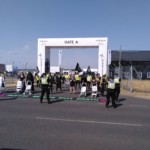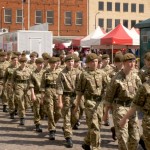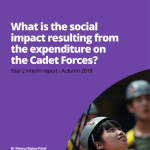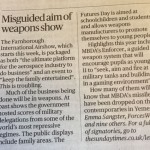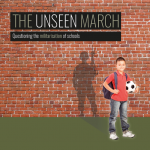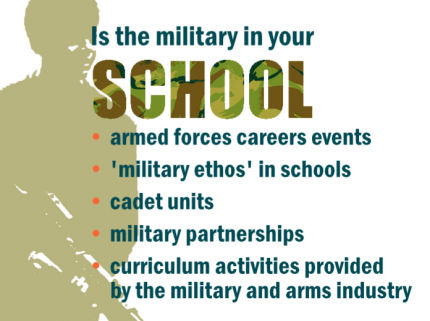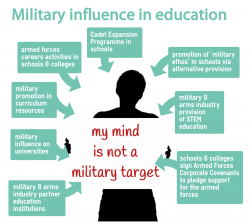 The UK armed forces visit thousands of schools each year. They offer career presentations, curriculum resources and other activities aimed at promoting the interests of the military and long-term recruitment. Since 2012, the Department for Education have promoted ‘military ethos’ programmes such as cadet units in state schools and ‘alternative provision with a military ethos’.
The UK armed forces visit thousands of schools each year. They offer career presentations, curriculum resources and other activities aimed at promoting the interests of the military and long-term recruitment. Since 2012, the Department for Education have promoted ‘military ethos’ programmes such as cadet units in state schools and ‘alternative provision with a military ethos’.
The armed forces and arms companies are increasingly involved in the provision of STEM (science, technology, engineering and maths) activities for school and college students. and they also sponsor a number of careers-led secondary schools. The armed forces also now sponsor youth organisations like Girlguiding and Scouts. See more here.
Should the armed forces by given access to children within education? How can we challenge their activities in schools and colleges? How can a more balanced view of the military be given to young people?
While there are claims that school involvement is not about recruiting young people, the Ministry of Defence has itself stated that visits to educational establishments are a ‘powerful tool for facilitating recruitment’.
In having contact with young people, the military aim to sow seeds in impressionable young minds. In 2007, the head of the Army’s recruitment strategy said, “Our new model is about raising awareness, and that takes a ten-year span. It starts with a seven-year-old boy seeing a parachutist at an air show and thinking, ‘That looks great.’ From then the army is trying to build interest by drip, drip, drip.”
The influence of military interests in education and youth activities raises concerns around:
- recruiting-related activities in school
- child welfare issues
- the unrepresentative portrayal of the armed forces
- weapons in schools and at public events aimed at interesting children and teenagers in a military career
- the need for balance in teaching controversial issues
- the lack of balance with other career providers coming into schools
- the lack of parental consultation and policy scrutiny
- concerns around targeting disadvantaged areas and prioritising over other youth activities
- lack of balance with education for peace
- marginalising individuals and groups to do not wish to participate in military-related activities
See our briefing on Military involvement in education and youth activities in the UK.
We recognise the importance of debate and critical thinking in helping young people make an informed choice about the military and its activities. This is particularly important for those thinking of a career in the forces, a uniquely risk-laden occupation. If the military are allowed to have a presence and influence in the UK education system then it should be balanced by a thorough exploration of opposing views and approaches, as demanded by the 1996 Education Act.
Useful resources
Armed forces visits to Scottish schools – a ‘big issue’
Science for Society
 Science4Society Week is a collection of science education activities, co-ordinated by Scientists for Global Responsibility, and designed to inspire young people. It takes place in March each year.
Science4Society Week is a collection of science education activities, co-ordinated by Scientists for Global Responsibility, and designed to inspire young people. It takes place in March each year.
Teaching Remembrance: focusing on ‘why?’
Scottish petition makes headway
Rethinking Remembrance in Schools
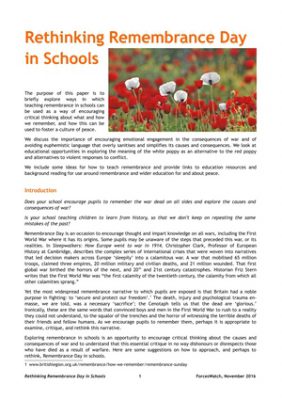 This paper, published by ForcesWatch, explores ways in which teaching remembrance in schools can be used as a way of encouraging critical thinking about what and how we remember, and how this can be used to foster a culture of peace.
This paper, published by ForcesWatch, explores ways in which teaching remembrance in schools can be used as a way of encouraging critical thinking about what and how we remember, and how this can be used to foster a culture of peace.
Tory boost for cadets in schools needs fighting
This article was first published in the Morning Star
The Defence Secretary, Michael Fallon, recently announced that 25 out of 150 proposed new school cadet units would soon be opening. Despite the presentation of this development as new policy, the Cadet Expansion Programme promoting cadet forces in state schools, was first announced in 2012. While the Government heralds the cadets as a silver bullet in terms of improving pupil attainment and development, the sight of ranks of pupils as young as 12 in military gear and handling weapons will ring alarm bells for many. That this is happening within education raises additional concerns.Scottish Parliament asks for more information on military visits to schools after hearing from ForcesWatch
UN observations on UK and childrens’ rights
The UN, child rights and the UK military
Scottish voices on armed forces visits to schools
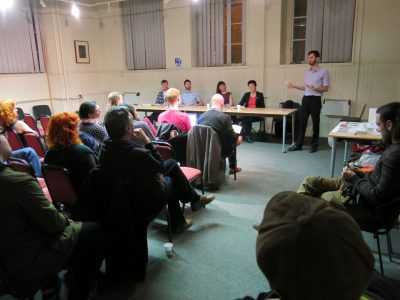 Before the closing date of our petition to the Scottish Parliament on military visits to state schools in Scotland, the ForcesWatch team went on the road to spread the word and raise awareness of the issue.
Before the closing date of our petition to the Scottish Parliament on military visits to state schools in Scotland, the ForcesWatch team went on the road to spread the word and raise awareness of the issue.

